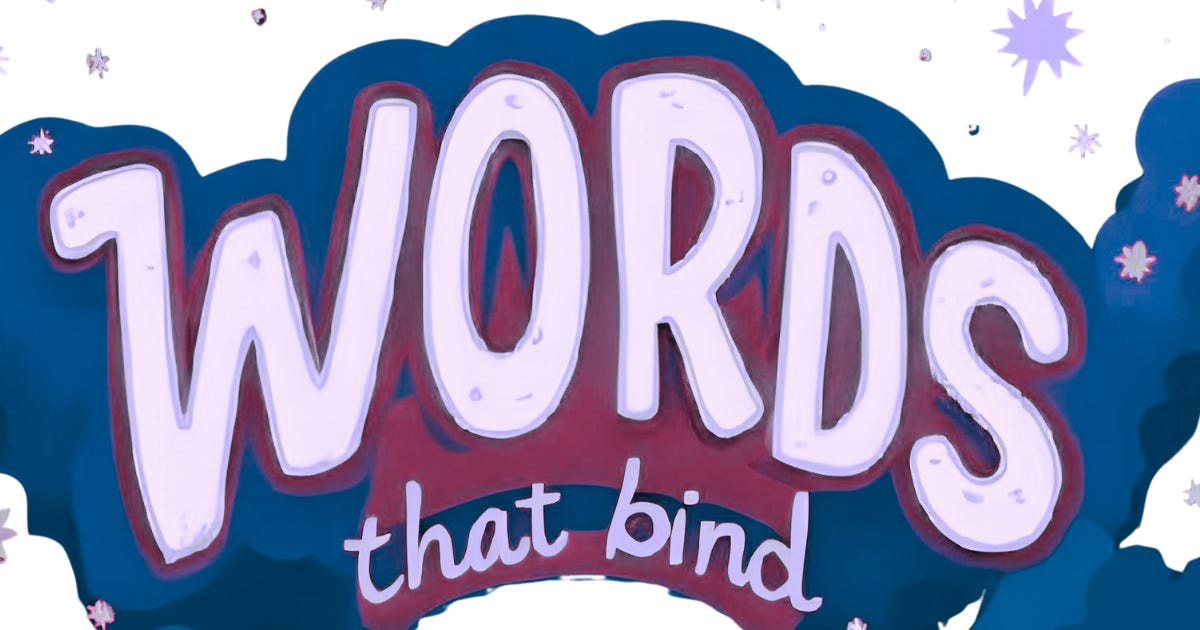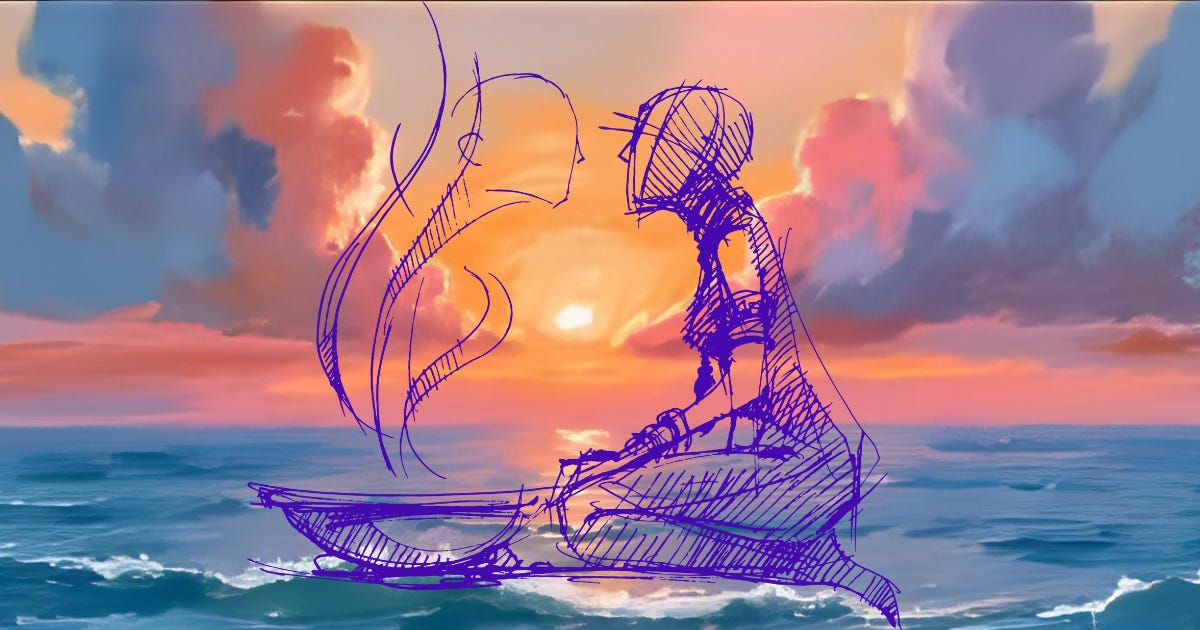Words that Bind
Crafting the Whale's Tongue - Essay Four
“I do.” A vow. Words that bind.
This fourth essay in the series of Crafting the Whale’s Tongue examines the language of the Biet Lagos, a fictitious alien species, as a more literal example of “words that bind.”
Previous essays in the series can be found here:
When Words Become Binding
“Words that bind.” What does that really mean?
For us Earthlings, the words might suggest a legally binding contract. You make an offer. I accept. And we act on terms of that agreement.
Or we might view ‘words that bind’ through a lens of social or emotional connections, such as vows, shared purpose, relational ties—which may, or may not be legally binding.
We humans say or feel words matter, don’t we? But for the Biet Lagos, words not only matter, they bind.
For the Biet Lagos, to speak is to perform truth.
For the Biet Lagos, law is not a code of statutes—it is the binding practice of truth in communication.
Also, keep in mind: as implied in preceding essays, the Biet Lagos do not actually utter words as we think of words. Rather they ‘emit’ information through a sort of dance between bioluminescent light pulses, sounds, and gestures. For the sake of discussion, however, we will refer to the beats of this dance as ‘words.”
Why Law = Language for the Biet Lagos
Recall that the Biet Lagos are largely an aquatic species. Their survival has always required absolute trust in signals. One miscommunicated pulse or click could mean danger, death, betrayal.
It became an evolutionary imperative that words carry authority, not casual noise. Thus, language is governed by law.
Law in a holistic sense, broader than legal jargon or the intention of justice. Law as an established practice of community, as a binding custom, to further the species.
Humans have laws, but I would suggest the purpose of our laws serves a slightly lesser purpose.
We think of our laws as keeping people safe. Safe is a good goal, and certainly would allow humans to move forward.
The intention of safety in human law, however, does not mimic the intent of language as law in the Biet Lagos, where the intent is more directly attached to becoming better as a species.
This is not meant as a slight on humanity. Rather, a reminder that the Biet Lagos are an advanced species (one of the things that threatens GAP’s ideal of human supremacy in World Beyond the Song.)
Framed in the broader view of law, then, words and language are sacred to the Biet Lagos. This is where ritual enters the picture, giving their language permanence.
The Sacred Whisps
The most sacred ‘text’ for the Biet Lagos is Sacred Whisps. The Sacred Whisps are not technically written; they are performed, binding memory to community through repetition.
I had to look beyond World Beyond the Song when developing the Biet Lagos. We won’t learn much at all about the Biet Lagos until the second book of the planned trilogy: Where Oceans Sing Beyond.
I could not develop a language for a species without first understanding what language would mean to that species. Hence, we arrived at language as law—emulating the theme of communication and connection throughout the trilogy.
The Sacred Whisps may be physically recorded at some point, but they exist as living performances and serve as a collective memory embodied. The Biet Lagos echo communal chants that reinforce a species-wide connection. Not homage to gods, but communion with the universe—with the stars themselves.
Did you know ‘Jayla’ translates to ‘Whispers Below’ in Threlraan? That glimpse may help you see through the eyes of the Biet Lagos.
So—my take on worldbuilding—if I want to invent a credible language for a credible alien species, I need to understand why they do what they do.
Ritual as Reinforcement
In our human world, the words we speak may mean something or not. They may just be babble. In the culture of the Biet Lagos, to ‘speak’ literally means to perform truth.
Light pulses, clicks, flips and sways are ritual acts that sanctify utterance—making them binding. And some click patterns, certain bioluminescent rhythms, and some combined movements are reserved for ritual law only.
In the preceding essay, Physiology Shapes Speech, we described a thuln—a phonic-lip-like organ through which the Biet Lagos create audible clicks of rhythmic syllables. It is considered both a biological and a sacred instrument … because it gave permanence to what they call the Choralith.
So, what is the Choralith, besides sacred?
In human terms, we can break down the word choralith into components of chorus (to imply, voice or choir) combined with lithos or stone. The choralith, then, is a stone or solid voice.
In the lore of the Biet Lagos:
The Choralith carries the law in sound. To speak without it is to speak without truth.
The ritual of language and its relevance are the law of language. In their world, every utterance must be authentic and sacred.
This is not unique to the Biet Lagos, however.
Real-World Parallels
Human history is filled with many oral law traditions. Consider Torah chanting, Vedic hymns, Homeric epics, and Indigenous songlines, to name a few.
Each of these forms of oral tradition preserve and transmit a community’s knowledge, values, and history through rhythmic performance. Repetition and fixed patterns, meter and rhythm, and performance are shared devices connecting sacred and communal knowledge.
It’s not just storytelling; it’s a preservation of cultural knowledge. Historical and spiritual records. Moral and social lessons. Scientific and practical information.
Choralith. A striking resemblance to Earth’s own oral law traditions.
Choralith. A liberty of worldbuilding that strives to explain the law of remembrance for the Biet Lagos.
Decision Point in Worldbuilding
Worldbuilding. Drawing from our understanding of the world, we can temporarily suspend disbelief, making the absurd or questionable seem plausible within a fictional context. Ultimately, that's the objective.
I could have created Threlraan as decorative texture. But without cultural weight, it would have been only cool—not credible.
By developing and understanding the how and why of a language’s cultural weight, we do something beyond cool. We create the moral spine of a society. We tie into the moral compass of World Beyond the Song—of Jayla’s struggle with GAP, with decoding the alien signal, and with trust itself.
When she whispers, ‘Hear me,’ young Red (Jayla) echoes the universe.
The Weight of Saying
When Jayla utters, “Speak to me,” it’s a plea in earnest. A truth the Biet Lagos will feel worth hearing.
For a message from the Biet Lagos to be misinterpreted—especially as a threat—is unthinkable, because it is unthinkable to the Biet Lagos to speak falsely.
For the Biet Lagos, speech = truth = law. For humans, speech no longer always equals truth. Perhaps we’ve wandered from that path—and perhaps that’s why I write—to reimagine words as binding again.
Our words can hold more weight than they often do.
Ritual preserves memory in performance. But what happens when memory must travel farther? Next time, we’ll follow the Biet Lagos as they begin writing the light.








This entire series has been fascinating! Thank you for sharing this look into your world and your process.